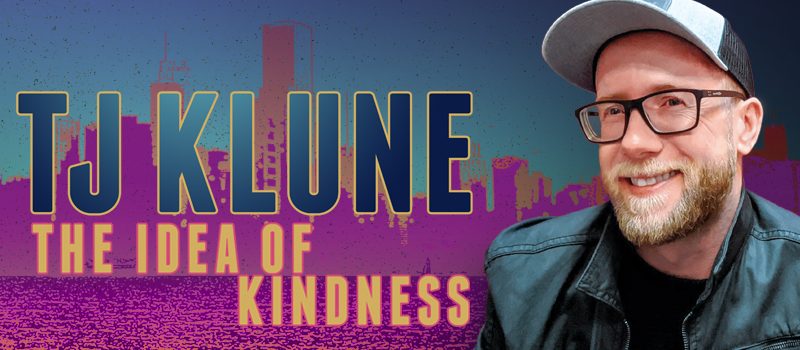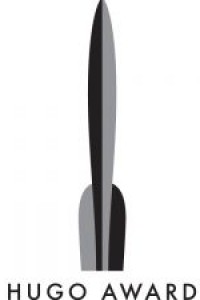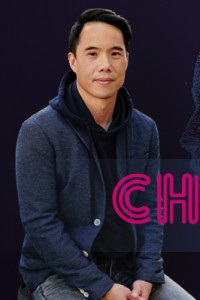TJ Klune: The Idea of Kindness

Travis John Klune was born May 20, 1982, in Roseburg OR, where he lived until his family relocated to Tucson AZ when he was 16. He moved to Virginia in 2013, where he worked in insurance before becoming a full-time writer in 2016.
Klune began publishing with Bear, Otter and the Kid (2011), and has authored numerous queer romances. His first work of genre interest was Burn (2012). Lambda Award winner Into This River I Drown (2014), Murmuration (2016), and The Bones Beneath My Skin (2018) are standalones. The Green Creek series is Wolfsong (2016), Ravensong (2018), Heartsong (2019), and Brothersong (2020). The Immemorial Year books are Withered + Sere (2016) and Crisped + Sere (2016). The fantasy Tales from Verania series includes The Lightning-Struck Heart (2015), A Destiny of Dragons (2017), The Consumption of Magic (2017), A Wish Upon the Stars (2018), and collection Fairytales from Verania (2021). His YA novel The Extraordinaries (2020) has a new sequel, Flash Fire (2021), with a third volume planned.
Klune’s breakout book was bestseller and Alex Award winner The House in the Cerulean Sea (2020). Afterlife fantasy Under the Whispering Door is forthcoming in September.
Excerpts from the interview:
“I grew up in a very poor, rural area in the mountains in Oregon, basically, on my grandmother’s farm, so when we moved, Tucson was the big city for me. But then of course, being a queer loudmouth kid with ADHD, you don’t really do well in rural areas, especially in the ’90s. So when we moved to Tucson, it was like an entire world had opened up. Now I realize that Tucson is actually quite small compared to a lot of other major cities, but to me when I first moved there, it was the biggest place I’d ever been to. I had never seen so many people in my life. It is the fading blue, turning violet, in a sea of Arizona red. Tucson has always had this weird conservative side, but on the flip side of that, it’s also always had this weird hippie-dippie liberal side to it too. There are these two extremes, and there really isn’t a lot of middle ground on either of those.
“The experience of moving did inform my writing, because I grew up with the same people. I went to elementary school with them, I went to junior high with them, and I spent to my first two years of high school with them. These were people that I’d known my entire life, and for a kid, you tend to think that’s the entire world. I mean, you read in books and see in movies that there’s an entire world out there, but until you actually go, you don’t really know that it actually exists. So moving to Arizona was not only a culture shock, but it changed how I saw the world. Let’s put it this way: if I had stayed in Oregon, there would have been no people of color in my graduating class, or in the town where I lived. Everybody was white. Then I moved to Arizona, which has a large indigenous population, a large Hispanic population, and a large Indian population – it is such a melting pot that it was literally like I had stepped out of this fake little world into the actual real world.
“My writing has gotten infinitely better since I started out. I was with an indie publisher for years and years, and they did my first book. I literally wrote a queer story and went online and googled queer publishers and they were one of the first that popped up, so I submitted to them and they wrote back saying, ‘Hell yeah, we’ll take the book.’ I stuck with them for a while. It was kind of like moving to the big city, but I didn’t know any better. I didn’t know how publishing worked. I didn’t have an agent. It did better than most everyone would have expected, I guess, and I got a couple of accolades for that, but it’s an imperfect book. I mean, everybody when they write their first book, they hope that it’s really good, but looking back on it now…. Oh, man, was I cringing with some of the stuff I was reading, that I’d thought was great, wonderful, this is so good, this is going to be the next great American novel. I had some really… interesting ideas when it comes to narrative arcs. I’ve gotten better at that.
“I got better by writing. Writing, writing, writing. I write pretty much almost every day, and that’s the only way I can get better. Also reading anything I can get my hands on, that will help make me a better writer. Editing too, because I learned really quickly that an editor is not there to hurt your feelings, or to cut out words that you absolutely love – because me, I love pretty much every word in the English language, and it shows, given the length of some of my books. There was a moment when the edits came in for the first book I’d written, and I was reading through them going, ‘Oh, okay, I guess I can see that. Oh, that kind of hurts a little bit, what do you mean this doesn’t make sense? Oh! It doesn’t make sense. I get this now.’ I realized that editing is there to make your book the best it possibly can be, and you have to divorce yourself from your ego. You can’t love your words so much that you can’t get rid of them, because it’s important to have that space between you and your own work, so that when the time comes to cut certain things with an editor who’s very good at what they do, then you can go with that. Because if you don’t, you’re not going to become a better writer at all.
“I have been a full-time writer since 2016. I was fortunate enough, and had the volume of work, to build a back catalogue which sells pretty well to this day, and I was able to quit my office job after ten years. It was the absolute scariest thing I’ve ever done in my entire life, because you leave the safety of salary and health benefits and a sure paycheck for a world where you have to monitor yourself. You have to produce. I told myself if I was going to be a full-time writer that I would actually need to do it. I can’t get distracted. I can’t say, ‘Oh, I’ve written for an hour, I might as well take the rest of the day off.’ So the very first day, a Monday at the beginning of March of 2016 – I left my job on the Friday before, and gave myself the weekend – I was up and sitting in front of my computer at 7 a.m., like I would have been if I still had a job, and I just started writing. Those first few months were me overcompensating for the free time I now found myself with, because I would be writing 10,000 words a day and pushing myself more and more. Then I realized I don’t have to do that, so I cut back. I used to keep track of my daily word count totals. I would write down what the total of the manuscript was at the end of the last day before, and then each day I would keep track of how many words I’d written. If I’d written fewer than 5,000 words, I considered that a failure. But that’s no way to go, because you’re putting this stress on yourself that’s completely voluntary, and I hit this point where I was like, ‘I can’t do this anymore,’ because I was getting frustrated. There are days when all the words come and you can write and write and write – and then you’ll hit a wall and nothing happens, and if you try to force yourself through that wall, you’re only going to piss yourself off more, and what you’re writing will be crap. So I don’t do that anymore. I still write Monday, Tuesday, Wednesday, Thursday, Friday, but I take my time. I don’t keep track of how many words I write; I let the story go how it should be going without worrying about the little minute details of tracking what I’m doing every single second of every single day. It was a godsend when I was able to let all that stuff go. I should never have put myself in that position to begin with, because it doesn’t matter. As long as I’m writing, it doesn’t matter if it’s a few words or a few thousand words. Some days I can’t get anything out, so I do something different, but most days I’ve been pretty good.
“My first book with Tor was The House in the Cerulean Sea, and that came out last year. I had been building up to this moment for two years, getting ready for this to happen, because we sold the book in 2018, along with a young-adult book called The Extraordinaries, I had two six-figure deals, and I was like, ‘Hell, yes.’ When you’re gearing up to that moment, you’re going through editing, everybody’s starting to talk marketing, and here’s your gigantic tour schedule, we’re sending you across the country, everything’s going to be wonderful. The book was scheduled to come out March 17, 2020, and the week before, the pandemic kicked into high gear. The Thursday before The House in the Cerulean Sea came out, my first book with this big, brand-new, shiny publisher, I got a call from the vice-president saying, ‘Hey, have you heard about this thing called COVID? We’re canceling every tour and every author that’s on tour is getting called back home, and we don’t know what’s going to happen.’ So I was just sitting there going, ‘Oh, cool, this wasn’t just the last two years of my life and my expectations aren’t sky high and now it’s nothing.’ Of course, every publisher had to scramble to figure out what to do next and how to act. My amazing publicist had to figure out how to convert everything to virtual, on the fly. I’d never heard of Zoom before the pandemic – I didn’t know what the hell Zoom was, and all of a sudden everybody’s talking about Zoom and all of this stuff. There I was, with the country on fire, everybody going into grocery stores buying all the toilet paper for reasons I still don’t understand, and I had to sit there saying, ‘Hey, um, I know everything’s scary right now, but I wrote this book about being nice to other people. Would you like to possibly buy it?'”
Interview design by Francesca Myman.
Read the full interview in the August 2021 issue of Locus.
 While you are here, please take a moment to support Locus with a one-time or recurring donation. We rely on reader donations to keep the magazine and site going, and would like to keep the site paywall free, but WE NEED YOUR FINANCIAL SUPPORT to continue quality coverage of the science fiction and fantasy field.
While you are here, please take a moment to support Locus with a one-time or recurring donation. We rely on reader donations to keep the magazine and site going, and would like to keep the site paywall free, but WE NEED YOUR FINANCIAL SUPPORT to continue quality coverage of the science fiction and fantasy field.
©Locus Magazine. Copyrighted material may not be republished without permission of LSFF.








